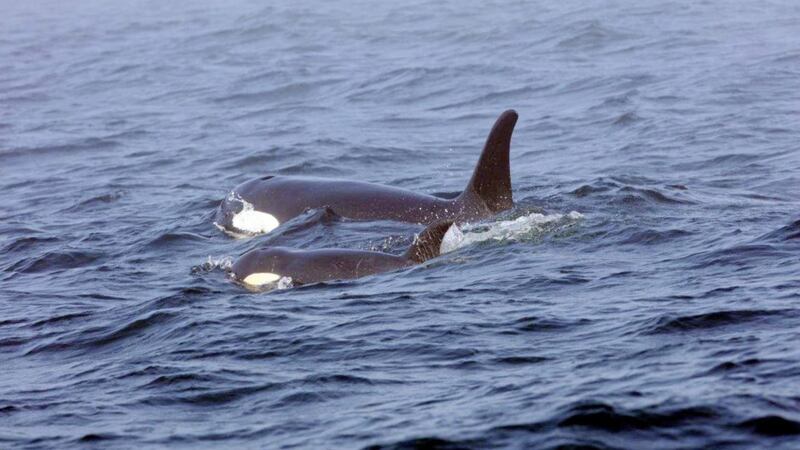THERE was great excitement after two orcas were spotted and filmed swimming in Strangford Lough in Co Down last weekend.
When I sent footage to a former resident of the shores of the lough who now lives in England, he told me that orcas were also spotted there in the early 1980s and wondered if they were members of the same pod. This is possible as pod members can stick together for many years as they roam and hunt for food, often returning to areas where they have been before.
They are an intelligent species and can communicate with one another using screeches, groans and clicks – with each pod having its own distinct dialect. They also use echolocation to navigate and build up a picture of what is around them and communicate when closing in on prey.
The two that swam into Strangford Lough last week are believed to be from a pod that has been spotted swimming off the coasts of Ireland and Scotland over the past year.
Orcas are actually a species of dolphin and earned the title killer whales because they feed on fish and larger marine life, including penguins and seals. Many species feed on the flesh of other species but few get the adjective 'killer' tagged onto them… we never say killer fox, killer falcon… killer human.
But we have a fondness for nailing human attributes to other species – when another orca swam up into Lough Foyle in 1977 and was stranded for a few days close to Derry it was nicknamed Dopey Dick. It was assumed that it had got lost through stupidity, although it had been chasing a run of salmon and eventually made its way back into the open sea without too much bother.
It is believed that the same orca may have still been alive as recently as 2014 when it was identified off the coast of Scotland – they live up to the age of 60 and so for all we know could still be swimming off our shores.
The idea that other species can communicate information and the navigation skills of marine mammals are areas of deep mystery. It is not just mammals that demonstrate attributes that go beyond simple instinct. Salmon, which are prey for orcas, have incredible navigation skills and will return to the rivers and quite often the same pools where they were born to mate or spawn their own young after swimming for thousands of miles in the open sea.
A tiny smolt born in a river in Antrim will make its way downstream into the open sea and its body will metamorphose so that it can survive in salt water before it swims to the coast of Norway to feed for four or five years before returning to its birthplace.
Lough Neagh eels make the reverse journey to Ireland, travelling from where they are spawned in the Sargasso Sea, south of Bermuda, across the Atlantic and swimming up the River Bann to the lough where they will spend more than 10 years maturing before swimming back across the ocean to spawn their own young.
All these of course have to endure huge risks as they make their epic journey – not least from 'killer whales' who will hunt them, or for that matter from killer humans.
Perhaps if we invested a bit more time studying and considering things like the languages of whales and the precision navigation skills of 'lesser' species of fish and eels rather than simply catching them for sport or to eat we might learn something more about the world we inhabit and the creatures we share it with.








